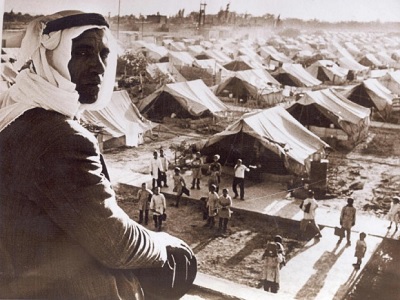
On the anniversary of World Refugee Day, and one month after the 69th anniversary of the Palestinian Nakba, or “catastrophe,” it is estimated that 66 percent of Palestinians who were living in British-Mandate Palestine in 1948 were expelled from historic Palestine and displaced, according to the Palestinian Central Bureau of Statistics (PCBS).
Today, the United Nations Relief and Works Agency for Palestine Refugees in the Near East (UNRWA), the UN agency responsible for providing services to millions of Palestinian refugees, estimates that the number of registered Palestinian refugees in 2016 amounted to about 5.9 million, PCBS noted, highlighting that this figure was representative of a minimum number.
As of 2016, Palestinian refugees in the West Bank registered with UNRWA accounted for 17 percent of the total refugees registered with the organization, while refugees in Gaza accounted for 24.5 percent.
“We are tired, it’s enough”. On World Refugee Day, @UNRWA shares the voices of Palestine refugees in #Gaza RT pic.twitter.com/erN6TLwqa1
— Chris Gunness (@ChrisGunness) June 22, 2016
Touting one of the world’s highest unemployment rates at 44 percent, an estimated 80 percent of Gaza’s population is dependent on humanitarian assistance.
Across the diaspora, the percentage of Palestinian refugees registered with UNRWA in Jordan amounted to 39.1 percent of the total refugees registered, while the percentage of Palestinian refugees registered in Lebanon and Syria numbered at 8.8 percent and 10.6 percent, respectively.
According to UNRWA, while Palestinian refugees in Lebanon represent an estimated 10 percent of the population of Lebanon, they lack many basic rights, as they are not formally citizens of another state and are unable to claim the same rights as other foreigners living in Lebanon. Palestinian refugees in Lebanon, for example, are prevented from working in up to 20 highly-skilled professions.
PM Netanyahu calls on the UN to dismantle UNWRA for their support of terror -… https://t.co/STdf4iGhu0
— TV7 Israel News (@tv7israelnews) June 12, 2017
As a result, “among the five UNRWA fields, Lebanon has the highest percentage of Palestine refugees living in abject poverty,” the group said, adding that around 53 percent of the Palestinian refugees in Lebanon live in 12 recognized refugee camps, “all of which suffer from serious problems, including poverty, overcrowding, unemployment, poor housing conditions and lack of infrastructure.”
Meanwhile, the ongoing conflict in Syria has forced hundreds of thousands of Palestinian refugees from the country, including men, women and children, to flee to surrounding countries and other areas in Syria in search of safety
Last week, Israeli Prime Minister Benjamin Netanyahu called for the dismantlement of UNRWA, saying “UNRWA, to a large degree, by its very existence, perpetuates – and does not solve – the Palestinian refugee problem.”
…threatening water-supply and now food from UNWRA: Netanyahu adding one more 'plague'…it's almost Old Testamentical https://t.co/z6uDMN74UF
— Werther Nieland (@werthernieland) June 12, 2017
Palestine Liberation Organization (PLO) Executive Committee Member Dr. Hanan Ashrawi condemned Netanyahu, saying his statements were “the epitome of arrogance, particularly since Israel itself is responsible for creating the Palestinian refugee problem.”
“Israel should not be allowed to dictate how to change the legal system and to persist with its unlawful unilateralism,” Ashrawi said, adding that the Israeli government “bears a moral and legal responsibility for Palestinian refugees and the serious injustices of the past.”
UNRWA spokesman Chris Gunness responded to Netanyahu’s comments at the time, saying that the issue of Palestinian refugees could only be resolved through a negotiated end to the Israeli-Palestinian refugee conflict, instead of shuttering an aid agency catering to their humanitarian needs.
While UNRWA has been the target of Palestinian criticism on a number of occasions, Palestinian refugees, notably in the occupied Palestinian territory, see the preservation of their status as refugees as maintaining their claim to their right of return to the villages in historic Palestine from which their ancestors fled during the creation of the state of Israel.
(Maan, PC, Social Media)





The saddest thing of all of this is American’s have been led to believe that this is all fabricated propaganda to promote alleged terrorism as a hobby for young Palestinian boys. Without full understanding of from the people’s of those who crush and destroy Palestinians, there won’t be change.